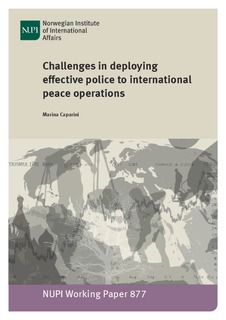| dc.description.abstract | This paper examines the challenges of deploying and using adequately prepared and appropriate skilled police personnel in UN peace operations. It approaches this issue primarily, although not exclusively, through the prism of training. It briefly describes changes in the demand for and role of police in contemporary peace operations, and the existing system of recruitment, selection and training of police peacekeepers. It then considers four types of problems encountered in deploying effective police personnel in the areas of supply of personnel, skillsets, predeployment training, and performance. The paper holds that problems in these interconnected areas undermine the effectiveness and impact of police components in peace operations. While the UN has made some important efforts to improve recruitment and selection of police peacekeepers, and to standardize peacekeeping training of police prior to deployment, both selection and training standards continue to be inconsistently applied and inadequate. Resolving the perpetual problem of getting police peacekeepers with the needed capabilities deployed to missions will require more than simple technical fixes; the human resources challenge for police (as well as military and civilian personnel) in UN operations goes beyond recruitment and training to include questions of effective guidance, management, resourcing, and the monitoring and evaluation of peacekeeper performance to support institutional learning and adjustment of recruitment and training processes. The problem is complex and multifaceted, not least because the UN is an international organization with management challenges that are distinct from those encountered by national public service organizations. The UN’s organizational structures and processes themselves require attention. Solutions call for commitment and corrective action by PCCs, UN HQ, and the leadership of UN field missions. The paper contributes to broader ongoing discussions about what is required to improve the impact and effectiveness of peacekeeping personnel, and of peace operations more broadly. | nb_NO |

